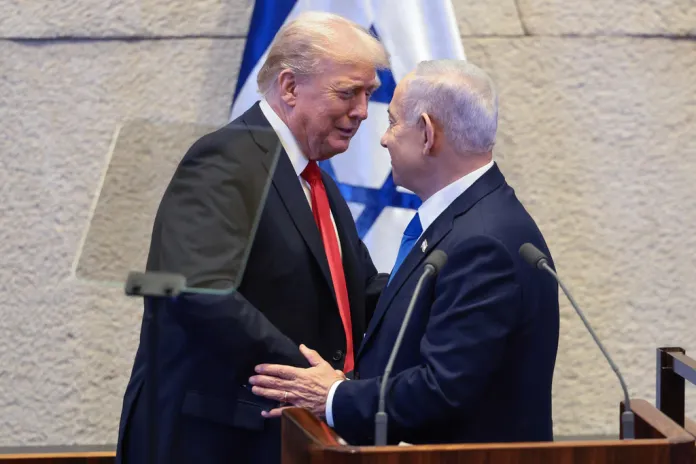President Donald Trump achieved the Gaza peace deal by leveraging Israel‘s reliance on the United States and exploiting Hamas‘s fear of him, flexing his influence over key players in the region.
In an extensive interview published by Time on Thursday, Trump gave readers insight into the behind-the-scenes discussions that led to the start of the ceasefire agreement this month, particularly his conversations with Israeli Prime Minister Benjamin Netanyahu.
“Bibi, you can’t fight the world,” Trump told Netanyahu days before the ceasefire was announced on Oct. 8. “You can fight individual battles, but the world’s against you.”
In a notable admission, Trump threatened to pull his support from Israel if it ever annexed the West Bank.
“It won’t happen because I gave my word to the Arab countries,” he said. “Israel would lose all of its support from the United States if that happened.”

That comment is especially relevant now, considering the Knesset voted on Wednesday to impose Israeli law and sovereignty on the West Bank through preliminary bills. Vice President JD Vance and Secretary of State Marco Rubio forcefully denounced the legislation, warning it could possibly threaten peace in the Middle East.
While supportive of Israel’s goal in its two-year war against Hamas, Trump became frustrated with Netanyahu at times. Before announcing the ceasefire, Trump went on a profanity-laced tirade, reminding Netanyahu of all he has done for Israel in the past, such as the creation of the Abraham Accords during his first term.
Israel’s strike on a Hamas outpost in Doha, Qatar, last month also strained the diplomatic relationship between the two world leaders. Trump said the decision was a “tactical mistake” made by Netanyahu, one that threatened to derail ceasefire talks and prolong the war even further.
“He would have just kept going,” Trump said of Netanyahu. “It could have gone on for years. It would have gone on for years. But I stopped him, and everybody came together when I stopped him.”
Arab countries, including Turkey and Egypt, proved instrumental in mediating an end to the conflict. The Trump administration believed that if the Arab world helped establish peace in the region, then the Israelis could make peace with the Palestinians in Gaza. Trump’s team called this the “outside-in” strategy.
Trump also took advantage of the “political capital” he wielded over Hamas, which feared what he would do once he returned to the White House in January.
“Hamas was signaling that they wanted to gain some political capital with the Trump Administration,” Middle East special envoy Steve Witkoff, one of the key players to negotiate the peace deal, told Time. “Beyond political capital, they were afraid of him.”
Applying pressure on Hamas, Trump delivered a stern message: Release all the “f***ing” hostages, or else face “complete obliteration.”
Hamas ultimately released all the last 20 living hostages, showing the demand mostly worked. However, the terrorist group has not released all the remaining 28 bodies of the deceased hostages.
Trump also instilled fear in Israel’s adversaries after the U.S. military used B-2 stealth bombers to target and destroy Iranian nuclear facilities in June.
“It would have been impossible to make a deal like this before,” he said of the strikes on Iran. “No President was willing to do it, and I was willing to do it. And by doing it, we had a different Middle East.”
In the interview, Trump appeared to take credit for Israel’s operation that remotely detonated Hezbollah’s pagers in September 2024 while he was running for office during the Biden administration.
“All of those attacks were done under my auspices, you know, with Israel doing the attacks—with the pagers and all that stuff,” he said.
VANCE CALLS KNESSET VOTE ON WEST BANK AN ‘INSULT’ TO TRUMP ADMINISTRATION
“They let me know everything,” he added. “And sometimes I’d say no — and they’d be respectful of that.”
Time noted that a spokesperson for Trump later clarified that he misspoke and meant to reference the Israeli strike on Doha.
